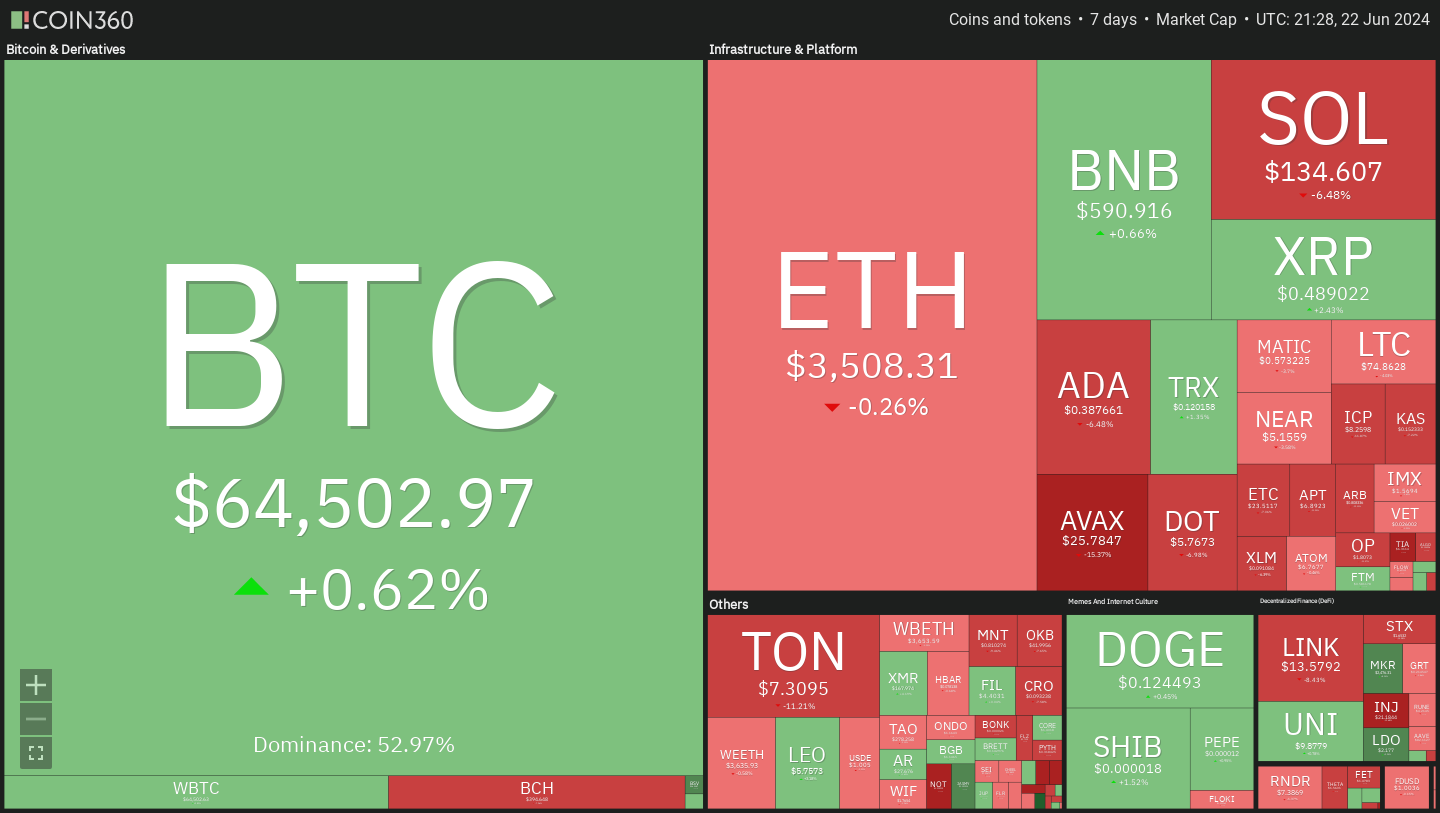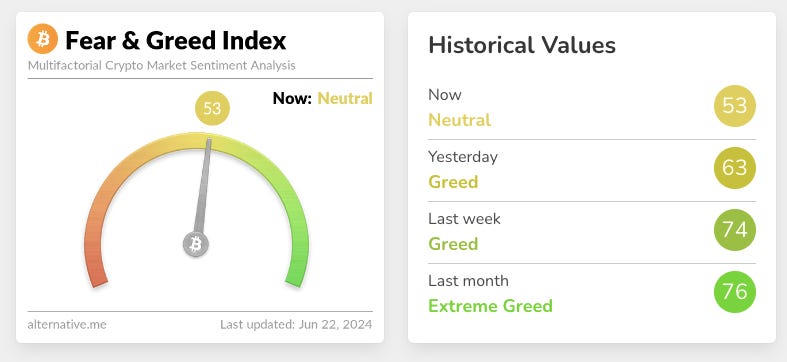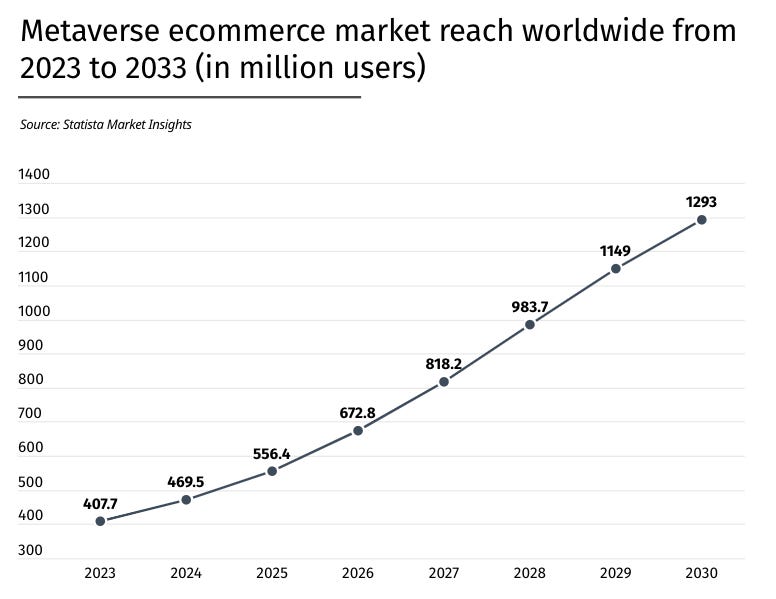📔 Weekly Journal: Explore Virtual Wales
[6 min read] Your weekend guide to getting ahead on the digital frontier. Today, the usual market news and how Wales is inspiring tourists by presenting Wales’ scenic and cultural highlights virtually
Welcome to this week’s Weekly Journal 📔, your guide to the latest news & innovation in emerging technology, digital assets, and our exciting path to the Metaverse. This is week 81 of the 520 weeks of newsletters I have committed to, a decade of documenting our physical and digital lives converge.
New subscribers are encouraged to check out the history & purpose of this newsletter as well as the archive.
- Ryan
🌐 Digital Assets Market Update
To me, the Metaverse is the convergence of physical & virtual lives. As we work, play and socialise in virtual worlds, we need virtual currencies & assets. These have now reached mainstream finance as a defined asset class:
Lots of volatility this week as Germany's Federal Ministry of Finance has commenced the sale of confiscated Bitcoin worth billions. The sale is conducted through a series of auctions managed by the German Federal Criminal Police Office. The Bitcoin, initially seized from criminal activities, underscores Germany's proactive stance in converting seized digital assets into public funds. In more positive news, this week Bernstein projected that Bitcoin could hit $200,000 by 2025, driven by increasing institutional adoption and favourable macroeconomic conditions.
🔥🗺️ 7-day heatmap below, showing the current share of the market for the top cryptocurrencies, and their change in price over the last week.
🎭 Crypto Fear and Greed Index is based on volatility, social media sentiments, surveys, market momentum, and a few other bits and pieces.
🗞️ Interesting news from this week
🏴 Wales has become the first UK nation to launch a “Metaverse Activation”, offering a virtual exploration of its attractions. Created by Visit Wales, the immersive experience on the platform Spatial showcases Welsh culture and heritage, including a historic castle, a cable car ride, and a Roman amphitheatre. Virtual visitors can undertake quests, such as finding hidden dragons, and create interactive itineraries featuring real-life locations and events. This initiative aims to inspire global tourists by presenting Wales’ scenic and cultural highlights in a novel, engaging way. Try it here.
🇸🇻 El Salvador’s President Nayib Bukele has proposed a Bitcoin-focused private investment bank, aiming to offer diverse financial services to Bitcoin investors. This announcement, shared by the Salvadoran Ambassador to the US, Milena Mayorga, comes just two weeks into Bukele's second term. Bukele, known for making Bitcoin legal tender in 2021, continues to promote cryptocurrency despite mixed results. His popularity largely stems from significant reductions in crime, transforming El Salvador's safety profile dramatically since his initial election.
Australia's first Bitcoin ETF, issued by VanEck, has gained approval from the Australian Securities Exchange (ASX). This ETF aims to provide investors with a straightforward and regulated means to gain exposure to Bitcoin without needing to directly purchase and store the cryptocurrency. The product will track the price of Bitcoin, offering a secure and regulated way for Australians to participate in the growing digital asset market. This move is seen as a significant step in mainstreaming Bitcoin investment, reflecting a broader global trend of institutional adoption of cryptocurrencies
👓 Read of the Week
This weeks read is “Metaverse ecommerce to become a $200 billion industry by 2030”. Worth a read but if you are tight for time, here are my key take aways:
Metaverse e-commerce is expected to reach $200 billion by 2030, growing significantly from current levels.
Major companies like Amazon and Alibaba are integrating metaverse technologies to enhance shopping experiences.
The global market for metaverse e-commerce is projected to be $30 billion by 2024, with rapid growth anticipated.
Asia, particularly China, along with the US, are key regions driving this growth.
User penetration in metaverse e-commerce is predicted to reach 19.5% by 2030, with 1.3 billion users engaged.
🎥 Watch of the week
Coney High School in Maine has embraced virtual reality (VR) technology with students and educators alike are captivated by VR's potential to revolutionise learning experiences. From exploring German cultural landmarks to delving into ancient civilizations in history class, VR immerses students in subjects like never before. Teachers appreciate its flexibility in customizing lessons and ensuring a secure educational environment. Moreover, early exposure to VR not only deepens learning but also sparks students' interest in future careers involving technology.
AI 🎨🤖🎵✍🏼
In the Metaverse, AI will be critical for creating intelligent virtual environments and avatars that can understand and respond to users with human-like cognition and natural interactions:
Researchers at Google DeepMind found that artificial intelligence (AI) struggles with writing effective comedy, a sentiment echoed by professional comedians. During workshops at the 2023 Edinburgh Festival Fringe, twenty comedians found AI-generated material, using tools like ChatGPT and Bard, to be uninspiring and devoid of humour. The study revealed that AI could produce outlines but lacked the human touch needed for truly funny content. Participants described the AI's output as bland, with one calling it “a vomit draft” that required extensive revision. The comedians noted AI's inability to grasp nuances like sarcasm, dark humour, and cultural context. Furthermore, the use of AI raised ethical concerns, particularly around bias and the reinforcement of hegemonic viewpoints through moderation strategies. While AI-generated jokes were compared to outdated "cruise ship comedy," the comedians stressed that effective humour relies on personal experiences, cultural understanding, and emotional depth—qualities AI currently lacks. The study underscored that the subjective and nuanced nature of humour makes it challenging for AI, reassuring comedians that their jobs remain secure.
That’s all for the free version this week! If you have any organisations in mind that could benefit from learning about emerging technology, be sure to reach out. Educational workshops are one of many consulting services I offer.
DCA With Me 🤑
Dollar Cost Averaging is an investment strategy in which an investor regularly invests a fixed amount of money into a particular asset/asset class at regular intervals, regardless of its current market cycle. By doing so, the investor can reduce the impact of market volatility and potentially earn a better return over time. Motto = time IN the market beats trying to time the market
To experiment with this, I invest $50 NZD into a Digital Asset every week. Each week I will choose an asset that seems underpriced in the short term and has positive long-term potential. My timeframe is 3-5 years. I don’t give financial advice but if you want to follow along with me you can use my easycrypto.co.nz referral link to support this newsletter. Let’s dive into this week’s pick:
Keep reading with a 7-day free trial
Subscribe to Metaverse Field Guide to keep reading this post and get 7 days of free access to the full post archives.




